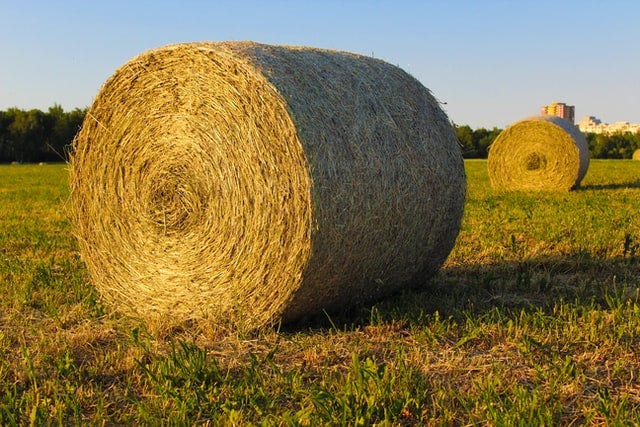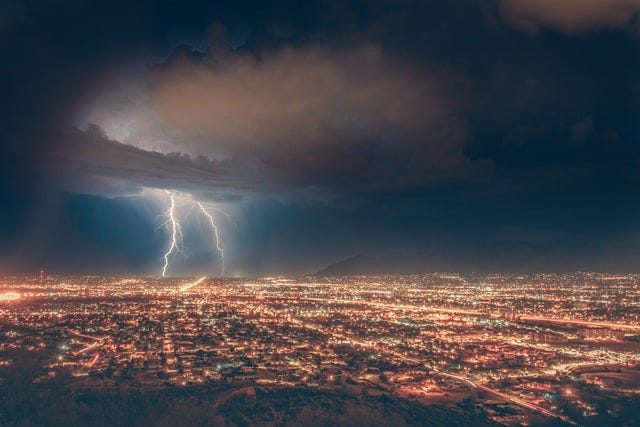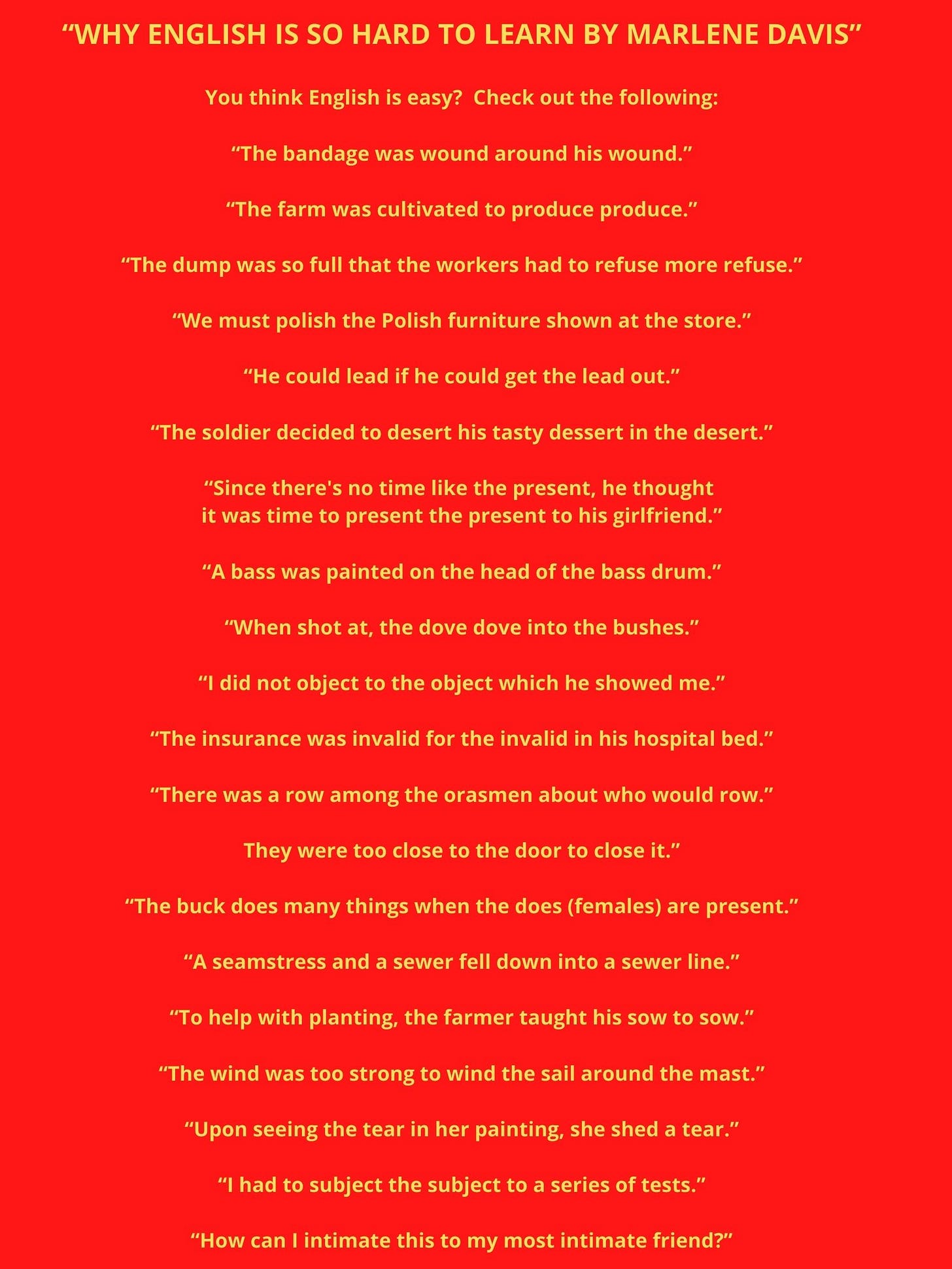Winning English - Mastering Idioms, Slang, and Cultural References
Summer and storms • Heat wave • Dog days • Hurricane, Typhoon, Cyclone • Storm is brewing • Weather the storm • Calm before the storm • Eye of the storm • Make hay while the sun shines
Here in the US, we’ve been suffering through a series of heat waves. Many other parts of the world are, too. A “heat wave” is when it’s unusually hot for a long time. It’s as if a giant ocean wave that’s made of heat instead of water is crashing over the land. By the way, we also talk about cold waves when it is unusually cold for a long time.
All of this unusual weather got me thinking about words and sayings associated with summertime and storms. Let’s get to it!
Interested in a podcast version of Winning English? Check out my site on Podbean or find it in your favorite listening app.
The Dog Days of Summer likely aren’t what you think they are
First, let’s talk about the Dog Days of Summer. “The Dog Days of Summer” are what we call the several weeks from early July to mid-August. Many people believe this name is associated with actual dogs in some way. Usually the explanation is that it’s so hot that, just like dogs, we all just lay around trying to survive the heat.
But the name actually has to do with the star called Sirius.

During these weeks of the year, Sirius rises in the sky along with the Sun. It’s the brightest star in the sky (except for the Sun, of course), and the ancient Romans thought it was somehow responsible for the extra heat each summer. Also, Sirius is part of a constellation - or arrangement of stars - called “the Great Dog” in the West. Because of that, Sirius is known as “the Dog Star”.
So, when the “Dog Star” rose during the hottest time of the year, those days came to be called “the Dog Days of Summer”. Honestly, this is a really weird phrase, but believe me, you’ll hear English speakers use it.
Here’s a bonus summertime word for you: SPF. “SPF” stands for “Sun Protection Factor”. It’s a way to measure how well sunscreen protects you from sunburn. The higher the SPF, the safer you are.
Hurricane? Typhoon? Cyclone? What’s the difference?
Here in the northern Western Hemisphere, we are beginning the most intense part of what we call “hurricane season”. A hurricane is a giant storm that can cause lots of damage over a huge area. These storms are also called typhoons or cyclones. So, what’s the difference with all of these words?
Actually, there isn’t any difference! They are all the same kind of storm. The word “hurricane” evolved from a native Caribbean language and is used primarily in the Americas. The word “typhoon” evolved from Eurasian languages and was first used by European sailors to describe these storms in eastern seas near India and China. “Cyclone”, meanwhile, is a general term for all of these storms and is used for other parts of the world.
By the way, hurricanes, typhoons, and cyclones start out as “tropical depressions”, then become “tropical storms”.
Are you enjoying Winning English? If you are, please consider donating to this service through Patreon. I currently don’t charge for subscriptions, and I don’t have any advertising. Any amount would help. I count on support directly from readers like you. Thanks! 🙏🏻
Stormy phrases
Storms have such a big impact on human life that it shouldn't be surprising that many phrases and sayings come from this weather.
First, a storm is brewing. Yes, we use the verb “brewing”, as if the storm is tea or coffee or beer, which are drinks that we “brew”. This phrase can be used figuratively, as well as literally. In other words, we can say “a storm is brewing” to describe when an actual rainstorm is coming. That’s the literal sense. But we can also say this phrase when we think that bad things of any kind are about to happen. That’s the figurative sense.
Most “storm” sayings can used in these literal and figurative ways. For example, if we are strong and lucky, we will weather the storm. In this phrase, the word “weather” is used as a verb. It means to survive a storm. We can “weather” both real, or literal, storms, and we can “weather” very bad situations, or figurative storms.
Sometimes, before a storm arrives, it can become very quiet, and the air will become very still. This is called the calm before the storm. I’ve actually covered this saying before in a previous Winning English. In short, it means that the situation is okay now, but it’s about to turn bad.
Finally, there’s an odd feature of hurricanes and typhoons. In the middle of these storms, it’s actually quite calm with clear skies. This area is called the eye of the storm.
I suspect that it’s called “the eye” because it looks a bit like the pupil - or the black, middle part - of the human eye. Anyway, “eye of the storm” also has a figurative meaning. It refers to a time in the middle of a bad situation when the “storm” seems to have ended, but really, it’s just a quiet period before the bad times begin again.
If you’re interested in a musical treatment of this phrase, check out the song “Hurricane” from the popular Broadway musical “Hamilton”:
Sunny skies are ahead!
Okay, that’s enough talk about stormy weather! Let’s end with a saying that involves sunny skies - Make hay while the sun shines.
This is a very old and old-fashioned idiom, but you’ll likely still hear it from time to time. “Hay” is what we call grasses that are grown to feed to animals. Farmers grow and harvest these grasses, then bundle them into interesting shapes.

It’s far easier to make hay when it’s dry and clear. So, when the “sun shines”, it’s time to “make hay”. In other words, farmers take advantage of the good conditions to make progress. This phrase has since come to be used in all walks of life. If things are good for you now, but could be worse later, you should “make hay while the sun shines”.
Why is English so hard?
As some bonus content for this edition, I have a list of sentences that you can find in many places on the internet. It was written by Marlene Davis, though I’m afraid I don’t know who that is. Anyway, this list is a bit of a test of your English pronunciation skills. Each sentence has a pair of words that are spelled exactly the same, but are pronounced very differently. Have some fun, and give it a try! I’ll record the answers later and post them in a future edition.
Thanks and please share
Thanks for being part of Winning English! I hope you enjoy it. If you do, please like, comment, and tell a friend about it by sharing this post.
Make sure to subscribe to the newsletter here on Substack, and also make sure to follow Winning English on Facebook, LinkedIn, or Instagram.
Maybe even consider donating to this service through my Patreon page. I don’t sell ads, and I currently don’t charge for subscriptions. I rely directly on you to keep this service going.
Thanks, and talk soon!
Bill
You writer & host






